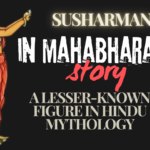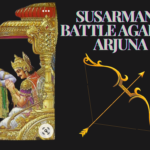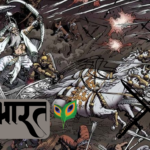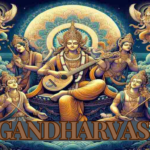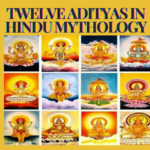In the ancient Indian epic, Mahabharata, the death of Bhishma, one of the most revered and formidable warriors, holds great significance. Bhishma’s death on the battlefield of Kurukshetra was not only a turning point in the war but also a poignant moment that embodies the themes of duty, sacrifice, and destiny. This article delves into the circumstances of Bhishma’s death, how he was killed by the Pandavas, and the events that followed his demise.
Bhishma.
Bhishma, also known as Devavrata, was the son of King Shantanu and Ganga. He was known for his unparalleled valor, wisdom, and devotion to his duties. Bhishma took a vow of celibacy and lifelong service to the throne of Hastinapur, making him the custodian of the kingdom and a key figure in the Mahabharata. His vow earned him the name Bhishma, which means “he of the terrible oath.”
Bhishma was the patriarch of both the Kauravas and the Pandavas, and his loyalty to the throne bound him to fight on the side of the Kauravas during the Kurukshetra War, even though he knew that the Pandavas were on the path of righteousness. His presence on the battlefield was a significant boost for the Kauravas, as his might and strategic prowess were unmatched.
The Battle of Kurukshetra and Bhishma’s Role.
The Kurukshetra War was the culmination of the conflict between the Pandavas and the Kauravas over the rightful claim to the throne of Hastinapur. The war lasted for eighteen days, with both sides suffering heavy casualties. Bhishma was appointed as the commander-in-chief of the Kaurava army, and under his leadership, the Kauravas gained an early advantage in the war.
Bhishma’s prowess on the battlefield was unmatched, and he wreaked havoc on the Pandava forces. His presence was a major obstacle for the Pandavas, and they knew that defeating Bhishma was crucial for their victory. However, due to his invincibility and the boon of Ichha Mrityu (the power to choose the time of his death) granted by his father, King Shantanu, Bhishma was nearly impossible to kill.
How Bhishma Was Killed by the Pandavas.
The Pandavas, led by Yudhishthira, sought the counsel of Krishna, their guide and charioteer, on how to defeat Bhishma. Krishna advised them to use a strategic approach rather than a direct confrontation. He revealed that Bhishma had vowed not to fight against a woman or anyone who had once been a woman. This information led the Pandavas to seek the help of Shikhandi, a warrior who was born as a woman but later transformed into a man.
On the tenth day of the Kurukshetra War, the Pandavas executed their plan. Arjuna, the third Pandava and an exceptional archer, was positioned behind Shikhandi. As Bhishma saw Shikhandi approaching, he recognized him as Amba, a woman from his past who had taken rebirth as Shikhandi to fulfill her vow of revenge against Bhishma. True to his vow, Bhishma lowered his weapons and refused to fight Shikhandi.
Seizing this opportunity, Arjuna unleashed a barrage of arrows at Bhishma. The arrows pierced Bhishma’s body, and he fell from his chariot, paralyzed but not dead. Bhishma’s body was supported by the bed of arrows, a sight that symbolized the pain and suffering he endured for the sake of his duty.
The Power of Ichha Mrityu
Though Bhishma was mortally wounded, he did not succumb to his injuries immediately. Due to the boon of Ichha Mrityu, Bhishma had the power to choose the moment of his death. Bhishma, being a devout follower of Dharma and aware of the significance of timing in his death, decided to wait until the auspicious period of Uttarayana—the winter solstice when the sun begins its northward journey.
Bhishma spent fifty-one nights lying on the bed of arrows, imparting his knowledge and wisdom to the Pandavas. During this time, he taught them the nuances of Dharma, statecraft, and the Vishnu Sahasranama—a collection of a thousand names of Lord Vishnu.
Bhishma’s Final Moments and the Legacy He Left Behind.
On the day of Uttarayana, Bhishma finally decided to leave his mortal body. Surrounded by the Pandavas, the Kauravas, and other warriors, Bhishma’s final moments were marked by peace and serenity. He sought the blessings of Lord Krishna and left his body, ascending to the heavenly realms.
Bhishma’s death marked a significant turning point in the Kurukshetra War. With his demise, the Kauravas lost their greatest warrior and strategist, and the war tilted in favor of the Pandavas. Bhishma’s life and death continue to be remembered as a testament to the ideals of duty, sacrifice, and devotion to one’s principles.
Disclaimer : While Writing this post have taken some content reference from different blog posts around the web and also chatgpt. If you think I have directly copy paste your content ,please contact me . I assure you that I will remove the content within 24 hours.
